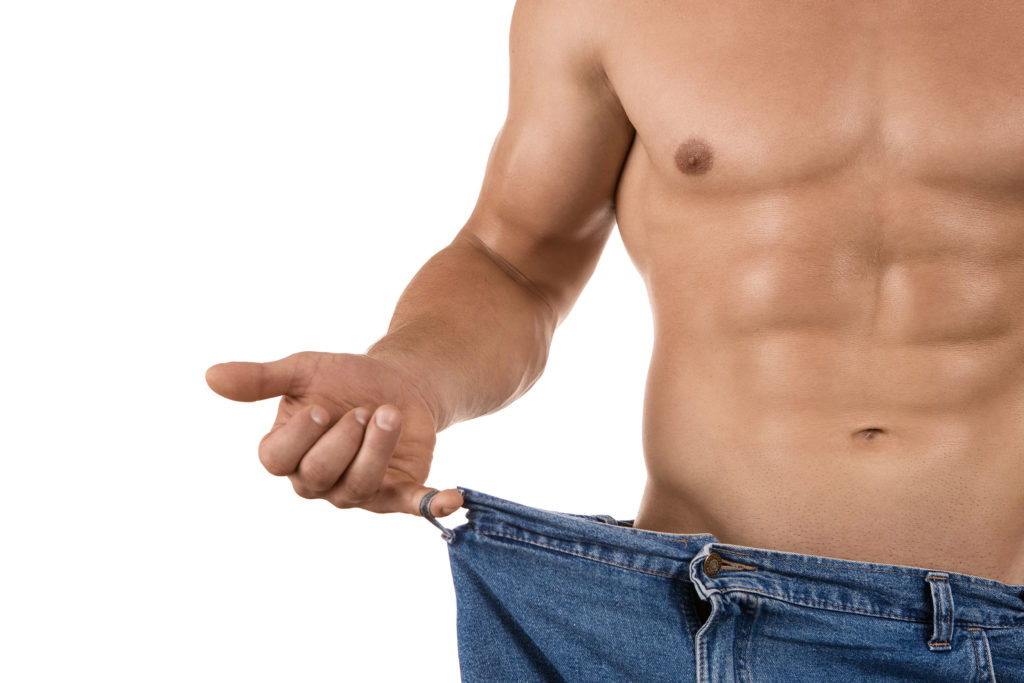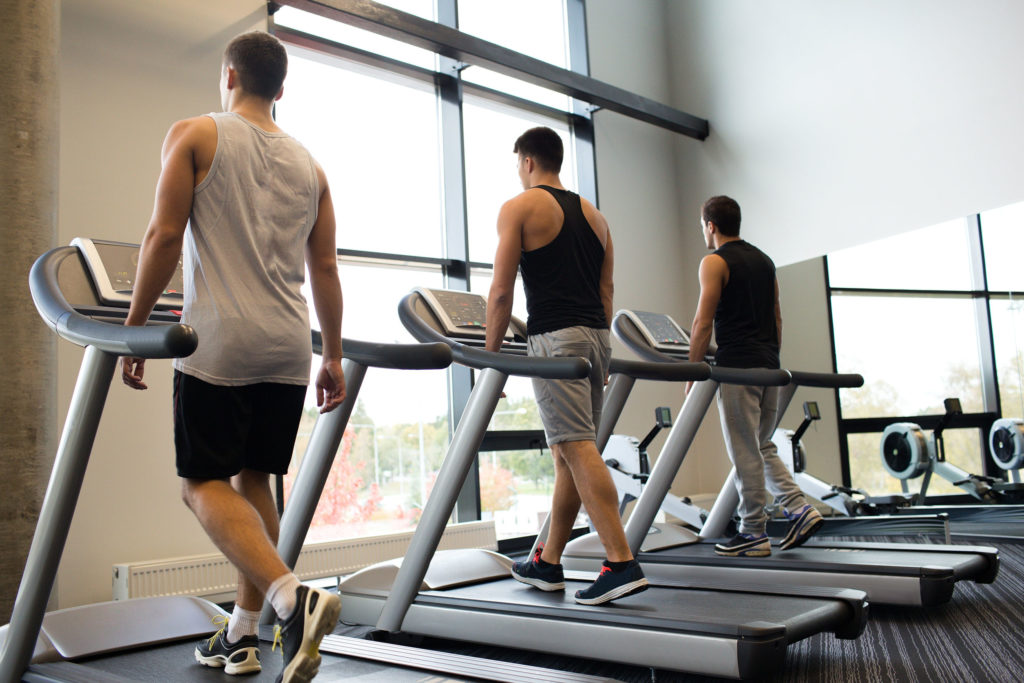Today’s guest post comes courtesy of Boston-based strength coach and trainer, Ryan Wood. Ryan’s made a cameo appearance on this site in the past writing a two-part series on lessons he learned preparing for his first powerlifting meet. You can check those out HERE and HERE.
Switching gears, today he’s discussing lessons learned and myths he avoided in losing 25 lbs. and dropping down to 10% body fat. Like a boss.
Copyright: rangizzz / 123RF Stock Photo
5 Myths Killing Your Fat Loss Progress
Today I’m going to outline five fitness myths I avoided to lose 25lbs. (I previously wrote a post talking about seven things I learned dropping to 10% body fat which you can read HERE.)
Fitness myths run rampant, and, unfortunately, steer many people in the wrong direction. If fat loss is your goal then follow along closely as I discuss five of the most common fitness myths killing your fat loss progress.
Myth 1- You’ll Lose Strength
A lot of people fear losing strength when they begin a fat loss diet. Common belief says if you cut calories your strength has to suffer.
While you shouldn’t be too concerned about hitting one rep max personal records, you certainly don’t want to risk losing strength.
So what should you do?
The answer is carbohydrates. Too many people drastically cut carbs when beginning a fat loss diet. This usually results in quick weight loss but also a huge decrease in performance and strength. Carbs are your main energy source and fuel your training sessions. If you’d like to retain as much strength as possible while shedding excess body fat then keep your carbs in your diet for as long as possible.
I believe when fat loss is the primary goal you should train with higher volumes to help retain muscle mass as calories decrease.
Because of this, I suggest aiming to hit new 8-10 rep maxes
The higher volume training will help you preserve muscle, which when you transition back towards building strength, will be imperative for improving your top-end numbers.
Here’s me hitting some sumo deadlifts towards the END of my diet:
My best all-time sumo pull is 510lbs which was done at a powerlifting meet after months of prep and peaking.
It’s definitely possible to keep most of your strength, if not improving it slightly, albeit in different rep ranges.
Take home points:
- Keep carbs as high as possible to help fuel hard training sessions.
- Focus on improving 8-12 rep maxes, not maxing out.
- Keep the goal the goal. Don’t worry if you can’t hit your all time best at this exact moment in time. Focus on your fat loss goal if that’s your priority.
Myth 2- You Must Eat Clean And Avoid Certain Foods
The gurus say the only way to get leaner is to eat clean or only eat gluten free, organic, dairy free, or sugar-free .
This is what I think of when I hear ‘clean eating’:
Now, don’t get me wrong, I think eating whole foods the majority of the time is a great way to get leaner and in better shape. It’s what I do *most of the time.
But eating clean 100% of the time is not a requirement for fat loss. Nor is avoiding entire food groups or demonizing certain foods.
Why?
Because I love ice cream too much.
And burgers.
And ice cream. Oh, I said that already.
You can and certainly should be able to enjoy a treat every now and then while still reaching your fat loss goals.
I did it and you can, too.
You just have to be in a calorie deficit, which means you’re consuming fewer calories than you’re burning.
If you’ve got room to spare in the calorie department, enjoy an ice cream. Just make sure you’re still under your calorie allotment for the day.
Remember, calories are your number one fat loss priority. No amount of clean eating will help you get results if you’re consuming 1000 more calories than you should be.
Take home points:
- Create an energy deficit by taking away 250-500 calories from your baseline diet.
- Eat a balanced diet of whole foods but don’t fear or avoid certain foods because someone tells you to.
- Enjoy treats every now and then provided they fit into your calorie goals.
Myth 3- You Have to Diet For A Set Amount of Time
About a week and a half left on my 12-week diet I hit my goal weight and felt pretty good with my physique and the progress I had made.
So I ‘ended’ my diet.
Basically, I went from continuing to try to lose any more weight right into a maintenance phase.
You can set goals to diet for 8,10, or 12 weeks but that doesn’t mean you HAVE to diet the entire time.
If you hit your goals early, then by all means, stop the diet and move into a more sustainable diet.
You’re the only one that can determine if you’re happy with your progress and if you should stick out your diet for another couple weeks.
I’m not saying this to give you an excuse to end your diet a month early. I’m simply saying if you’ve put in 8 or 9 weeks and have hit your goal weight OR better yet, feel phenomenal with how you look, then stop your diet.
Dieting is not a sustainable part of fitness. It’s a somewhat brief period of time in the grand scheme of things to help you reach your goals.
Put in the work, be consistent, and end your diet early if you’re happy with where you’re at physically and mentally.
Take home points:
- You can end a diet early if you’re happy with where you’re currently at progress wise.
- Once you end your diet, slowly add calories back in to stabilize your weight and give yourself some diet ‘relief.’
- On the flip side, don’t extend your diet week after week because you aren’t at your final end goal. Sometimes it takes several 10 or 12 week periods to reach your goal. As a point of reference, my progress took about 7 months.
Myth 4- You Must Do Cardio to Lose Fat
I’m not a cardio hater, I promise.
But the truth is, cardio is not the magic to fat loss.
Copyright: dolgachov / 123RF Stock Photo
Better yet, it’s 100% not required to lose fat.
Can it help? Of course, it can.
But it’s definitely not something you have to do in order to trim up. As long as your diet is in order, you will lose fat doing pretty much anything. I prefer a heavy dose of resistance training combined with a calorie deficit.
Cardio is a tool that can be used to enhance progress but I wouldn’t rely on it as your only form of exercise if you can help it. Check out THIS piece where I discussed why I prefer lifting over cardio for fat loss.
Take home points:
- Cardio is not a requirement for fat loss. A calorie deficit is the number one most important. Period.
- If you like or enjoy cardio then include it in your programming. Try to have more lifting days than cardio if possible. This will help you retain more lean mass while losing body fat.
- Cardio is not magic. Don’t rely on it to make up for a poor diet.
Myth 5- You Shouldn’t Get Hungry If You’re Eating the Right Foods
Yea. I know. It’s crazy to think some people believe that eating the ‘right’ foods will keep them from getting hungry during a diet.
The truth is, if you aren’t getting hungrier the further you get into your diet, your results are probably pretty crappy. Hunger is a fact of dieting. Eating less (calorie wise) is required to lose body fat.

There are no magical foods that will alleviate your hunger when you’re 10 or 11 weeks into a fat loss diet. Sure you can increase food volume by consuming more low-calorie foods like dark green veggies, but hunger is real and very important.
It tells you whether or not you’re headed in the right direction. You should be experiencing hunger as you progress week to week in your diet. At the beginning of your diet, you might not be super hungry. However, every time you make an adjustment to your plan, you will feel hunger rumbling deep down inside your stomach.
Use this as feedback that progress is being made. Don’t get tricked into believing that you shouldn’t get hungry after losing 10, 15 or 20+ pounds. Anyone that says you won’t be hungry during your diet is completely crazy or has never dieted before.
Remember, you won’t starve. Being hungry is completely normal during a diet so try your best to embrace it.
Take home points:
- Hunger is a normal part of dieting
- While still controlling for calories, eating lower-calorie, volume-dense foods can help with hunger a little bit.
- Use hunger as feedback that you are making progress
Wrap Up
If you can avoid these five fitness myths you’ll likely be off to a good start. To help you set up your own fat loss diet, grab your free copy of ’10 Commandments of Fat Loss’ HERE.
Remember that progress, especially fat loss, takes time and lots of hard work. It won’t happen overnight that’s for damn sure.





